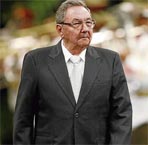With Raul Castro, Cuba learns to navigate without Fidel
 Havana - This year's unprecedented parade of foreign leaders in Havana - six from Latin America and one from Africa - is a sign that at least one thing has changed in Cuba since February 24, 2008, when Raul Castro took over as president of the communist island.
Havana - This year's unprecedented parade of foreign leaders in Havana - six from Latin America and one from Africa - is a sign that at least one thing has changed in Cuba since February 24, 2008, when Raul Castro took over as president of the communist island.
Within the country, however, the great expectations about far- reaching structural changes in Cuba have virtually died over the last year.
For the international community, Cuba appears to have taken large strides.
After Castro's government signed two international agreements on human rights and commuted several death sentences, the European Union lifted sanctions that had practically frozen its ties with Havana for five years. Within a few months both sides restored a political dialogue.
Cuba's recent influential visitors have included presidents Hu Jintao of China and Dmitry Medvedev of Russia, showing that Fidel Castro's younger brother was closely courting the two powers that could threaten the dominance of the United States.
While reaching out to the world, Cuba has made sure not to forget its immediate neighbours in Latin America. The normalization of ties with Mexico was only the first step in Havana's rapprochement with the region beyond its ally of recent years, Venezuela.
At a December summit meeting in Brazil, Latin America turned to the communist island - Cuba joined the Rio Group of Latin American and Caribbean states, and the region's leaders demanded the end of the decades-old US embargo.
Castro has reiterated that he would be willing to meet US President Barack Obama in some "neutral place."
The Cuban president recently noted the renewed international support for Cuba and said it shows "that times are changing."
"You are gradually getting unity within diversity, which is what it should be like. We already know what it is like to live in pretence international unanimity," he said.
Cuban dissidents, however, are suspicious about Castro's fresh foreign relations agenda.
Manuel Cuesta Morua, spokesman for the social-democratic Arco Progresista, told Deutsche Presse-Agentur dpa that such intense diplomacy has the sole goal of "seeking greater international legitimacy at a time when (Havana) does not have serious resources to move the country forward."
Dissident economist Oscar Espinosa Chepe agreed.
"The problem cannot be solved by looking abroad, even if that is good," he said. "They have cast aside the fundamental force, which is the Cuban people, engaging in dialogue with them, searching for internal solutions that have practically been cast aside with very superficial measures.
"Unfortunately, the numerous expectations that Raul provoked across the whole population, including members of the Communist Party, have not been fulfilled," Espinosa Chepe said.
In his inaugural address, Castro raised Cubans' expectations by announcing the elimination of "absurd prohibitions."
In his first few months in power, Cubans witnessed with joy and surprise an end to bans on owning mobile phones, computers and DVDs as well as stays at luxury hotels on the island.
There were some economic reforms, especially around the contentious issue of agriculture - the government was determined to increase production in a country that imports 85 per cent of what it consumes at ever-rising prices. Cuban authorities decreed the large- scale transfer of idle land to peasants and liberalized the sale of farming implements.
Castro ended a historic equality policy by scrapping the salary ceiling and launched a gradual reform of the Cuban administration - which has not quite materialized yet - to make the government and institutions less bureaucratic and "more effective."
Many of these measures can only be evaluated after well over a year, particularly because Cuba suffered three devastating hurricanes in 2008 that caused damage estimated at 10 billion dollars. Next followed the onslaught of the global economic crisis, to which the island was not immune.
However, hope for further changes - like the end of exit permits and the adoption of greater social liberties - have not become concrete.
For Cuesta Morua, there is only one explanation.
"Raul Castro has preferred to bet on continuity with cosmetic changes that give the feeling that the country is headed for certain necessary transformations, but that really keeps things where they were before," he said.
Some in Cuba's diplomatic community have expressed the view that people expected "more" from Castro. But Dan Erikson, an expert on Cuba at Inter-American Dialogue, a US think tank, sees things differently.
"None of these changes represent sweeping change, and most are reversible," he said. "But it still indicates that Raul's vision for Cuba is more moderate and pragmatic than the mix of ideology and charisma practised by Fidel." (dpa)